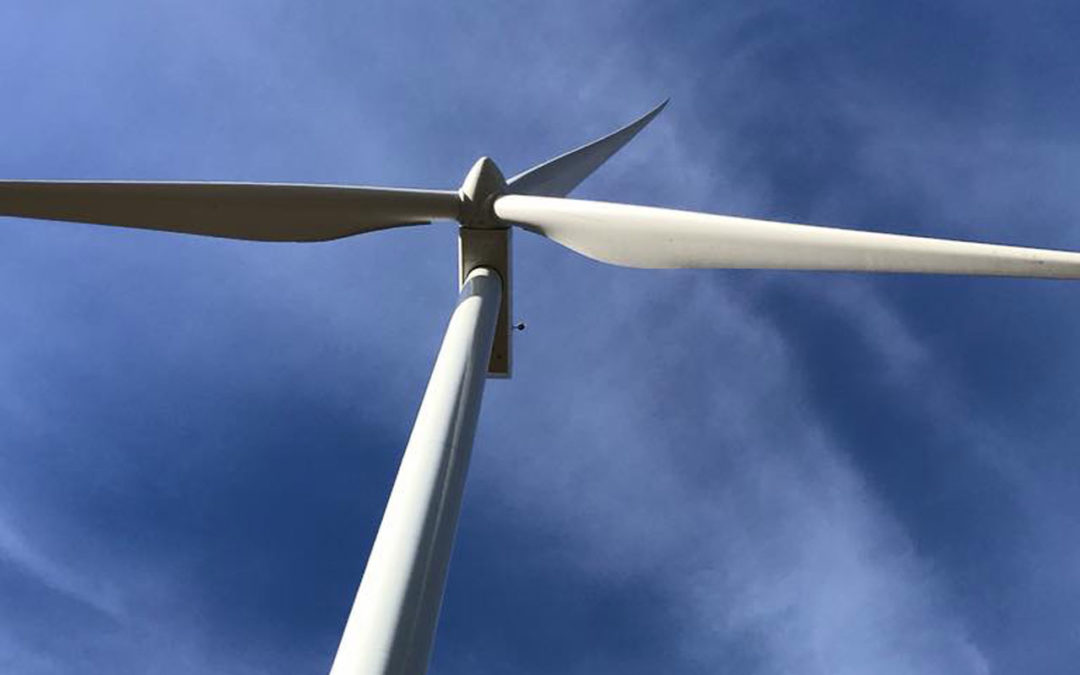
by Heather Allen | Feb 22, 2019 | Renewables, Utility Scale, Wind
After a prolonged absence from Wisconsin, wind developers are starting to come back to the Badger State with a desire to build projects. EDF Renewables, a nationally prominent renewable energy developer, has applied to construct and operate Green County’s first wind farm near the Illinois border. Called the Sugar River Wind Farm, this 24-turbine project would, if approved, generate an amount of electricity equal to what 20,000 households typically consume.
The Green County Board of Supervisors will review EDF’s 236-page application, which was submitted in late January, and will likely make a decision on the 65-megawatt project in July.
To accommodate the turbines, EDF envisions leasing almost 6,000 acres of farmland in the Town of Jefferson from area property owners. Participating landowners expect to continue farming operations while the wind farm operates.
As with other wind projects, the Sugar River Wind Farm will have a significant impact on the local economy. According to the application, more than $550,000 will flow to local landowners and governments each year during the project’s operation. Of that total, Green County and the Town of Jefferson will reap a combined $250,000 annually in the form of utility local aids.
Jefferson Township’s annual tax revenue income could increase by nearly 40% over 2019 levels as a result of this project. The project will also support 70 to 100 temporary construction jobs and three to five operations jobs over the life of the project.
If approved, Sugar River would be the second major wind energy development in Wisconsin to advance after a protracted lull in wind development activity that lasted between 2011 and 2017. Between a hostile political environment and a glut of generating capacity, utility-scale wind development activity languished in Wisconsin. During the dry spell here, developers flocked to neighboring states to tap into one of the most cost-effective clean energy sources available to utilities. The door reopened slightly when Dairyland Power Cooperative agreed to purchase electricity generated from Quilt Block Wind Farm, which started operating in November 2017.
Local Businesses Benefit from Wind Farms
Located in Lafayette County, Quilt Block has been hailed as a success by community leaders from the Town of Seymour and the City of Darlington.
“The Quilt Block Wind Farm in Darlington is a great asset to the City of Darlington and to Lafayette County,” said Darlington Mayor Dave Breuning. “During the construction, the employees were great to work with and they were very supportive of the retail businesses in Darlington.”
Mayor Bruening noted that Quilt Block’s labor force drove Ford trucks and had their vehicles serviced at the local auto dealership. Employees patronized area grocery stores and gas stations, and took their printing work to the local print shop, he said. “And then the Quilt Block Wind Farm built the office and garage in the Darlington business park. What a great addition to the City!”
More Efficient Wind Farms Lead to New Wind Proposals
Wind projects have become increasingly productive, as turbines are designed to be taller with longer blades to capture winds higher up in the sky that blow at faster speeds. “There’s an old physics equation that says when you can double the speed of the wind you are catching, the power that you’ll produce goes up eightfold,” Tyler Huebner, Executive Director of RENEW Wisconsin. “It’s a cubed relationship.” As the technology improves and wind farms become more cost-competitive, developers are working again in Wisconsin and coming forward with new proposals.
Wind Regulations and Project Review Timeline
When it took effect in 2012, Wis. Admin. Code § PSC 128 established the formal process that all local governments must abide by when reviewing permit applications for wind farms under 100 MW. The rule also set standards that local governments may apply to the placement of wind turbines as well as their construction and operation. Local governments have the option of adopting, for example, setback distances that are less stringent than the baseline standards in PSC 128. However, they may not impose standards that are more stringent than those specified in that rule. Wind energy projects in excess of 100 MW are reviewed by the Public Service Commission.
Green County has 90 days from the date of the application (Jan 30, 2019) to adopt a wind energy ordinance and an additional 90 days to review and approve the proposed project. At its March 12, 2019, meeting Green County Board of Supervisors will consider a resolution to adopt a wind ordinance. Wind energy projects that aren’t approved by the County within the two consecutive 90 day periods after an application is submitted are automatically approved.
How Can I Support Wind Development in Green County and Wisconsin?
Green County residents can send an email to the Green County Board of Supervisors. Their contact information is available here.
Learn more about wind. A report titled “Wind Turbines and Health” was recently issued by three organizations: the Environmental Health Sciences Research Center (which exists within the University of Iowa College of Public Health), Iowa Policy Project, and Iowa Environmental Council. The report summarizes the results of the most rigorous research available on the benefits and risks related to wind power.
Join RENEW’s information session about wind power on March 25, 2019, at 5 pm at the Monroe, WI Super 8 Motel. Enjoy refreshments and hear from the Mayor of Darlington and his colleagues talk about their experience in Lafayette County with the Quilt Block Wind Farm.
*This blog post was written by Heather Allen with contributions from Michael Vickerman.
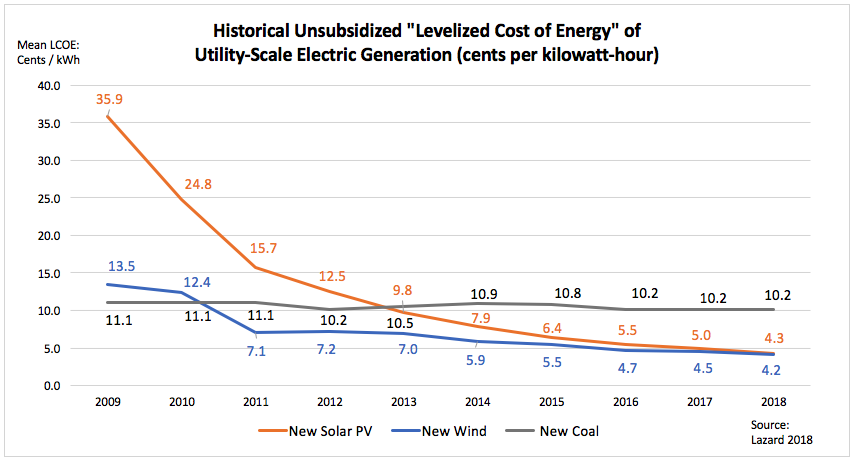
by Tyler Huebner | Feb 13, 2019 | Renewables
Yesterday, Wisconsin Manufacturers and Commerce President Kurt Bauer issued a statement regarding Wisconsin Governor Tony Evers’ pledge to join an effort to reduce Wisconsin’s carbon emissions in accordance with the goals of the “Paris Climate Accord.” Regardless of your position on climate change or the Paris Climate Accord, Mr. Bauer’s assertions about the economics of reducing carbon emissions are based on outdated math, especially as it relates to the price of electricity and switching to renewable energy.
Since 2009, the cost of delivered electricity from new wind energy farms has declined 69%, and the cost of delivered electricity from new utility-scale solar farms has declined 88%.
In their “Levelized Cost of Energy Version 12.0,” (available here) released in November 2018 by Lazard, a respected international finance company, the numbers about the unsubsidized cost of renewable energy are plainly spelled out.
Furthermore, a recent open bidding process in Colorado resulted in dozens of wind, solar, and battery storage proposals. Selecting the lowest-cost set of projects, Colorado policymakers and the utility were able to identify a set of projects that replaced existing coal generation while saving ratepayers $213 million to $374 million. (Source: Greentech Media)
Major Wisconsin utilities are currently pursuing their own least-cost pathway to future electric generation, and it involves shutting down older, less-efficient, and more costly coal plants while reinvesting in new wind and solar generation. Why? In their own words, it will save their customers money.
Just yesterday, in its quarterly earnings call, WEC Energy Group, which produces about half of the electricity used in Wisconsin, Executive Chairman Gale Klappa said “[W]e made real progress in reducing our carbon dioxide emissions. In fact, we are on track to exceed our goal of 40% reduction below 2005 levels by the year 2030. Now we expect to achieve that goal by 2023.”
The times have changed, and Wisconsin Manufacturer & Commerce’s math is outdated. Corporate America, including some of Wisconsin’s best job creators and industries of the future, are investing in renewable energy, saving money, and creating jobs.
Instead of just saying no, we would encourage WMC and its members to work with the renewable energy industry, electricity providers, Governor Evers, and the Legislature to pursue cost effective ways to take advantage of the new economics and technology advances in renewable energy. Renewable energy is now a job-creating and money-saving opportunity for its members and all businesses across Wisconsin.
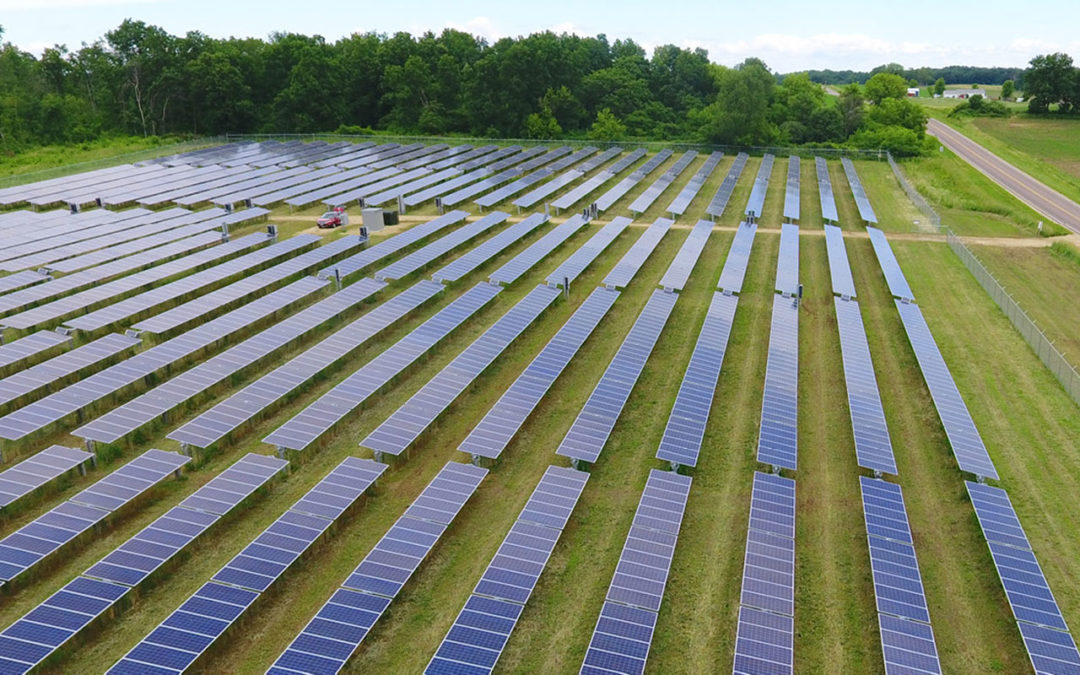
by Michael Vickerman | Feb 11, 2019 | Renewables, Solar
Saratoga Wind
Owner: Madison Gas and Electric
Location: Howard County, Iowa
Status: Online as of February 2019
Approved by the Public Service Commission in November 2017, Saratoga Wind is a 33-turbine installation totaling 66 megawatts (MW). MGE broke ground on the project in early 2018. Now operational, Saratoga is expected to generate between 275 and 300 million kilowatt-hours of electricity annually. Click here to watch a short, time-lapse video of Saratoga’s the construction.
Western Wisconsin Solar Arrays
Owner: OneEnergy Renewables
Locations in Wisconsin: Arcadia, Argyle, Cashton, Cumberland, Elroy, Fennimore, and New Lisbon
Total Capacity: 31 MWDC, 26 MW
Status: Under construction. All should be operating by June 2019.
OneEnergy is breaking ground this week on 10 solar arrays in the Upper Midwest that will supply electricity directly to municipal electric utilities in western Wisconsin and Minnesota. Seven of these installations will be located in Wisconsin. The financing for these projects is coming from multiple sources, among them Organic Valley, the City of Madison, and project owner BluEarth Renewables. In exchange for their contributions to the projects’ financing, Organic Valley and the City of Madison will acquire all the renewable energy attributes from the specific installations they are supporting. When the projects begin generating power this summer, the Arcadia array, sized at 7.45 MWdc (5 MWac), will become the largest solar array in the state of Wisconsin. Plymouth-based Arch Electric will construct several of the arrays.

by Heather Allen | Jan 4, 2019 | RENEW Wisconsin, Renewables, Solar, Utilities, Wind
Home-grown renewable electricity is poised for a big breakout this year. Two solar projects large enough to replace fossil-fuel power plants are making headway, while utilities in Wisconsin have made stronger renewable energy commitments. At the same time an accelerating number of nonprofit organizations, businesses, and citizens are turning to renewable energy for their own use.
Hearings are set this month for the Badger Hollow Solar Farm in Iowa County and the Two Creeks solar project in Manitowoc and Kewaunee Counties. The Public Service Commission will likely decide whether to approve of the two projects in mid-March. The utilities Wisconsin Public Service (based in Green Bay) and Madison Gas & Electric plan to acquire 300 megawatts of generation capacity from these plants, enough to power over 70,000 average Wisconsin households. If the two projects are approved, the utilities will be able to reduce their fossil-fuel emissions while increasing supplies of renewable power in their energy generation mix.
We expect another wave of large solar power plants to follow soon after the PSC issues decisions on Badger Hollow and Two Creeks.
Wisconsin electric providers are driving this transition to renewable energy through their recently announced plans to scale back carbon emissions.
WI Utility Commitments to Reduce Carbon Emissions and Increase Renewable Energy
UTILITY
|
APPROXIMATE NUMBER OF CUSTOMERS
|
CURRENT WI RENEWABLES MIX
|
STATED GOALS OR RECENT ACTIONS
|
WEC (WE Energies and Wisc. Public Service)
|
1.1 million + 440,000
|
7% WE
7.8% WPS
|
80% CO2 reduction by 2050
|
Alliant (WI Power and Light)
|
460,000
|
13.3%
|
29% renewables by 2024
80% CO2 reduction by 2050
|
Dairyland Power
|
258,000
|
14.4%
|
PPAs for 98 MW Wind (2017), 20 MW solar (2016), 80 MW Iowa Wind (2016)
|
Xcel Energy
|
256,000
|
28% (systemwide)
|
80% CO2 reduction by 2030
100% CO2 reduction by 2050
|
WPPI Energy
|
200,000
|
14.5%
|
PPAs for 132 MW wind (2018) and 99 MW solar (2020)
|
Madison Gas and Electric
|
145,000
|
10.1%
|
30% renewables by 2030
80% CO2 reduction by 2050
|
How can you help accelerate clean energy?Increasingly, businesses and nonprofit organizations are also committing to renewable energy. Solar for Good, the grant program managed by RENEW Wisconsin to support non-profits going solar, announced its most successful round of funding ever in 2018. The program’s Fall 2018 round announced that 36 organizations have been allocated $445,000 in grants which will lead to $4.5 million in solar investment in Wisconsin. At the same time major businesses are committing to clean energy. On January 3, 2019, Advocate Aurora Health committed to 100% renewable energy by 2030 for its 27 hospitals and 500+ outpatient sites in Wisconsin and Illinois.
This tremendous momentum would not be possible without RENEW members and supporters of clean energy from all across Wisconsin. One important thing you can do is to help us ensure the Badger Hollow Solar Farm is approved. A strong showing of public support will help this project, which needs approval by the Public Service Commission.
Please support the Badger Hollow Solar Farm by adding your name as a supporter here.
Happy New Year!
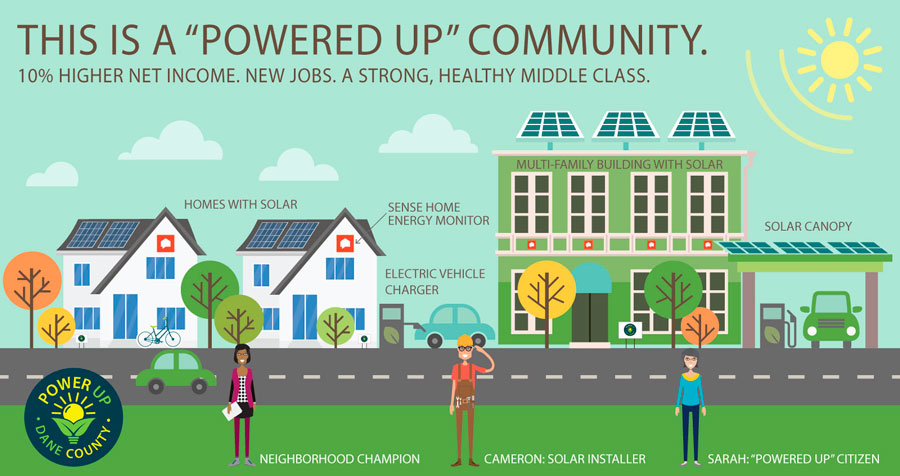
by Jane McCurry | Dec 3, 2018 | Electric Vehicles, Jobs, Programs, Renewables, Solar, Sustainability
Over the past three months, RENEW Wisconsin has been participating in an exciting and audacious challenge to develop ways to bolster the middle class of Dane County. UW-Madison was selected as one of four universities nationally to participate in a competition sponsored and funded by the Schmidt Futures Foundation, led by Google’s former CEO Eric Schmidt. UW’s program is called “Dream Up Wisconsin.”
The challenge is to increase the net income of 10,000 Dane County Families by 10%.
Our Plan: to “Power Up” Dane County families and communities with clean energy! We were one of 46 original applicants, and we were fortunate to be one of 11 applicants to receive $10,000 to more fully flesh out our proposal.
Our vision for Power Up Dane County is to create buzz about clean energy and provide community members the tools to adopt clean energy to reduce their monthly bills, create new jobs, and build a healthier community. We want everyone to have access to clean energy, from efficient homes to solar panels on their roof, and electric vehicles in their garage.
However, many middle class families don’t know that these technologies are available to them. Power Up is our idea to change that.
The program would start by empowering households to take control of their electricity bills using “Neighborhood Champions.” These champions will be excited members of the community who will help households install efficiency kits and the home energy sensor, Sense. Sense measures electricity consumption in real-time, and gives users a visual indication of their energy use through an app. By learning which devices in their home use the most electricity, residents can unplug energy hogs and save money.

After they have more efficient homes and a better understanding of their energy use, we want to connect participants with solar installers, home weatherization technicians, car dealerships that specialize in electric vehicles, and additional rebates for their clean energy investments.
Power Up will make it desirable, easy, and financially feasible for participants to adopt clean energy, like solar panels and electric cars. These clean energy technologies will reduce air pollution and save families thousands of dollars per year on their energy bills.
Power Up is competing against 11 other proposals for the top 3 spots. Should we be selected for the next round of competition, we will pitch our proposal to Schmidt Futures in Arizona in late January.
We believe in a future that is “Powered Up” with clean energy technology. That future includes millions of dollars of in energy bill and healthcare savings, new clean energy jobs, and a healthy and prosperous middle class. The momentum around clean energy is building by the day. With Wisconsin utilities, counties, and municipalities committing to 100% renewable energy, we know the future of Wisconsin will be one with extensive clean energy adoption. Power Up is one vision for how to get there.
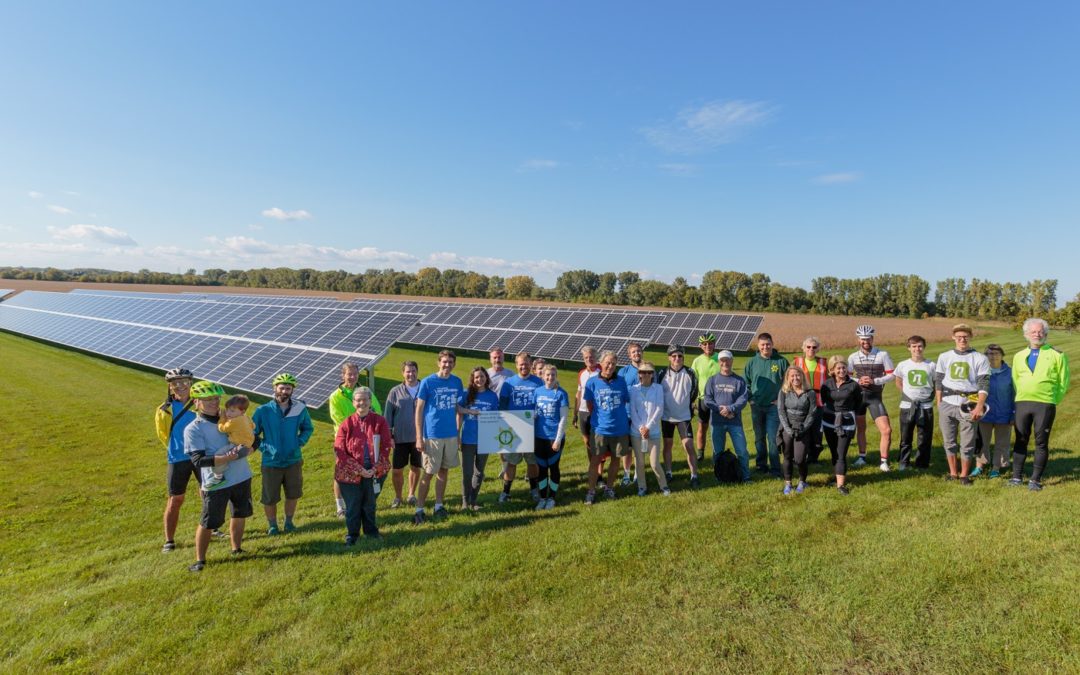
by Michael Vickerman | Oct 16, 2018 | Advocacy, Biogas, Focus on Energy, Programs, RENEW Wisconsin, Renewables, Solar, Wind
For many years, Focus on Energy’s renewable energy incentive program has labored under an operating environment resembling a regulatory roller-coaster. It has weathered funding suspensions, mid-stream budget reallocations, and an effort to replace rebates with loans.
But that extended wild ride is finally coming to an end, the result of Public Service Commission orders that will restore stability and consistency to Focus’s renewable energy offerings.
The PSC’s ruling in June 2018 locked in $22 million in renewable energy incentives for the 2019-2022 funding cycle, split equitably between residential and business customers. That allocation amounts to a funding increase of $4.7 million, or 27%, over the previous four-year cycle. In addition, the order granted flexibility to move funds between residential and business customers to better ensure all the funding is utilized.
A subsequent order in September 2018 locked in improvements to the business program, including a streamlined application process, a guarantee of request-for-proposals issued three times per year, and a funding set-aside for mid-size projects (between 20 and 100 kilowatts for solar power projects).
We are starting to see the results of these positive decisions!
The business program has an RFP on the street with applications due next week, on Tuesday, October 23rd, for the first round of projects that will be installed in 2019.
All in all, the PSC’s decisions tracked closely with the recommendations submitted by RENEW and its member businesses regarding funding levels and program design.
But before we dive into how it happened, RENEW wishes to thank PSC Chairperson Lon Roberts and Commissioners Mike Huebsch and Rich Zipperer for their votes in support of a strong, predictable, and consistent renewable energy program for Focus on Energy!
We would also like to thank the Commissioners’ Executive Assistants and the Commission’s Focus on Energy staff team for the role they each played in setting up success for 2019 through 2022.
The Anatomy of the Victory
Our goals for the 2018 planning process were twofold: first, to lock in a stable and well-funded operating environment for renewables; and second, to integrate needed process improvements to the incentive program targeting commercial installations. Our member businesses assisted us in formulating these recommendations which were based on an assessment of recently adopted tax and trade policies and their likely effects on customer appetite for onsite renewable generation.
Our success was made possible by the participation of several influential constituencies that weighed into the formal planning docket. For the first time in Focus on Energy’s history, associations representing general contractors, builders, and architects voiced their support for a well-funded renewable energy program. Drawing upon his background representing contractors at the Capitol, Jim Boullion, RENEW’s Government Affairs Director, was instrumental in engaging these groups to submit a letter conveying their support for continuing current funding levels over the next four years.
In addition, renewable energy businesses and associations across solar, biogas, and geothermal technologies weighed in with support. These businesses span the entire state, which helped us make the point that the renewable energy program serves rural and urban areas.

Geographic Representation of Signatories
Our success in 2018 was also made possible by RENEW’s organized media outreach and recognition swings across Wisconsin from 2015 through 2017. Those events highlighted the increasing appeal of rooftop solar for commercial customers, school districts, and agricultural producers, and called attention to the Focus on Energy incentives that moved these installations to completion.
The ribbon-cuttings and award ceremonies in locations such as Racine, New Berlin, and Darlington proved effective in generating positive coverage from the press. RENEW complemented that effort with analysis documenting the renewable program’s statewide reach and effectiveness in supporting Wisconsin businesses, both at the customer and contractor level.
That effort first bore fruit in October 2016, when the PSC decided to scrap the sputtering loan program and replenish the incentive budget for 2017 and 2018 with unspent loan dollars totaling more than $8.5 million. With that commitment in place, renewable energy businesses could bank on a relatively stable and adequate funding base, and break free of the fits and starts that had hampered their ability to meet growing customer demand.
Getting the 2017 and 2018 programs in place and, through our members, showing them to be successful gave us a strong negotiating position to showcase “what is working” and to advocate for continued rebate funding for 2019-2022.
In the end, it was a combination of RENEW’s strong advocacy on behalf of our member businesses and allies, and the PSC’s desire to see the program succeed that led to this positive outcome. We are fortunate to have so many actively engaged members who understand the value of speaking up with a unified voice.
Said RENEW Executive Director Tyler Huebner: “The Commissioners definitely heard the collective comments of our industry and stakeholders to make the renewable energy program as streamlined and business-friendly as possible. RENEW Wisconsin will continue to work with the Commission, PSC staff, and the Focus on Energy program administrators to make the programs simple for customers and the renewable energy marketplace, while ensuring cost-effective outcomes.”
Once again, thank you to our Members and Stakeholders who supported our positions, and to the PSC Commissioners, Executive Assistants, and Staff who all played instrumental roles in this process.
We look forward to a strong Focus on Energy renewable energy program for 2019 through 2022!







